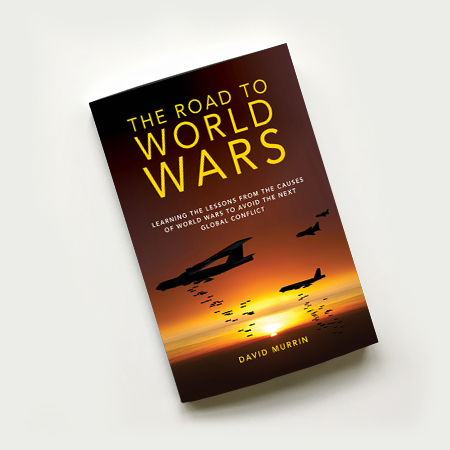Feedback
Posted by Former President FW de Klerk
I have worked through your well-written and disturbing book “Breaking the Code of History”. I am in broad agreement with what you have written and think the book makes a great contribution towards understanding the past and the present better, thus laying a sound foundation for preparing for the future.
Posted by Andrew Pancholi
A Ground Breaking Book - Ignore This at Your Peril.
“Breaking the Code of History.” is the playbook for understanding how our world reached this point in time. Additionally, it then projects forward in time making a range of concerning predictions for the next decade. Specifically, this is the story of humanity's manifestation of a sequence of civilizations that have reached the limit of their potential to expand, if we remain unconscious of the destructiveness of our repetitive behavioral patterns. Most importantly, David presents his evidence using a very advanced model, that humanity is approaching the critical time where the human race faces a choice between catastrophe or Consciousness. The foundation of his thesis is based on his incredibly incisive work which models the Five Stages of Empire. I absolutely recommend that you not only read , but also study the groundbreaking book.
Posted by Anric Blatt
A book that could change y(our) History
Every now and then a book comes along that can change everything and lead you down (or up) a new path; a path that you would not have discovered without reading it. I wish I had read this book in my twenties or even my thirties. But as St. Augustine once said: “It is better to live with remorse than with regret!” – I am happy to have read it now and introduce it to my friends and family and keep it as far away as possible from my competitors. It gives the reader an amazing insight into how the world really works and why history seems to annoyingly repeat itself and how to benefit from the inevitable consequences that follow along this path.
I first met David Murrin about 10 years ago when he came to our lake in Italy as the keynote speaker to coach our team on geopolitical macro issues affecting our investment decisions. It was hands down one of the best presentations I ever attended. I then lost touch for a few years and was recently reconnected after reading his book.
This book: “Breaking the Code of History” should be mandatory reading (and testing) for every single college entrant and should ideally become part of the school curriculum. (Yes, its THAT good).
Posted by Mark Conrad
I find it brilliant how you've brought hard history in with soft history (human processes) to create a powerful analysis of how things work.
Posted by Julian Debreuil
Having just finished David Murrin’s book, Breaking The Code of History, I have to conclude that it is the most complete work in the field of socio-politics that I have come across.Even that term does not cover the full breadth of material that the author injects into the four hundred and fifty-seven beautifully written pages. He covers a range of topics, laid out in sequential chapters, and ties the threads together expertly to give the reader a deep and clear view of both where the world is likely heading, and the many connected events that have put us on this course. Read more
Posted by James Hanshaw
The author has an incredible knowledge and applies it very well.
Posted by Samuel Sofaer
I don't agree with the previous review saying that Mirren is pessimistic regarding the US's present stage of decline. In fact in page 118 of his book Murrin suggests alliances between the US and Central and South America to form a single trade-free zone. This would as it were constitute a new Empire in the regionalistion phase. Murrin has likewise made a number of other constructive suggestions for other countries in the decline. There is no doubt that the US has overextended itself.Regarding the book, I must say I enjoyed it thoroughly and think it will have a pride of place in my bookshelf and prove to be useful reference book in the years to come. This book is well worth the price - I recommend it without reservation.
Posted by an American review
Excellent in every aspect not just the content but the quality of the book. Full glossy color plates and diagrams. As for the content, well, all the facts are there for each of us to make decisions that may help our families in the not too distant future.If you can find the book it is worth the cost and time.
Posted by an American review
Interdisciplinary Approach to Declinism - The Empire LifecycleAuthor David Murrin's contribution to Declinism is his model of what I call Empire Lifecycle. Murrin fits the U.S. by analogy and examples of empires past into his Five Stages of Empire. It's not difficult to recognize our predicament as fitting his 5th stage, called "decline." If you believe his stages and recognize the 5th as current, you might be a Declinist (Triumphalism is the opposite of Declinism). Murrin is a polymath, a person of great learning in several fields of study. His background includes finance and investment; geophysics; military history and more.
In summary, Murrin's Five Stages of Empire: Regionalism; Ascension to Empire; Maturity; Overextension; and Decline. Murrin's Model might remind readers of a model by the brilliant author Dr. Ichak Adizes, called, "The Corporate Lifecycle." The leadership dynamic in both models is nearly identical. However, Murrin's most important dynamic is demographics. Each stage in the model has a demographic dynamic unique to that stage.
The 5th stage of Murrin's model is decline, where he sees the U.S. right now. This stage is characterized by loss of geopolitical influence; protectionism; social fragmentation and discord; and pessimism. I think there's no debate about the pessimism association. On the sunny side, Murrin points us to Africa for investing purposes. The idea is that Africa is just in the first stage and thus investors can get in on the ground floor. However, Murrin predicts conflicts in that region over natural resources, with China a likely beneficiary as it moves to fill in the void in empire space.
Whereas Murrin's model identifies China as an ascendant empire, many academics will point out China does not have sufficient ability to project empire-like military strength. But Murrin explains how no economic empire in the history of the world had failed to militarize. Further, he identifies the male-to-female ratio in China, which is 56% and a full 5% more than world averages, as a demographic dynamic in favor of taking military risk sooner rather than later. This type of analysis is alarming, entertaining and makes the book a page-turner.
Murrin may have made a lasting contribution with The Five Stages of Empire. It's difficult to argue with this model though, because he shows how people in a declining empire tend to be in denial. Hence, if we hold an opposing viewpoint, he'd say we're in denial. Regarding the potential of investing in Africa, an investor may need additional specific information to protect against losing capital in the predicted resource wars. I recommend this book because I think most readers will find it entertaining and insightful.
Posted by Mike Robinson
Prophetic.
It is rare that one reads a book that so clearly unlocks the secrets of the past, and in a manner that turns these lessons into a prophetic agenda for the future. Well researched, easy to read and assimilate, beautifully laid out, interesting, and informative, this book is for anyone interested in how our civilization became and where it might lead. It contains some very interesting analysis on the rise and fall of empires and religions that one can translate immediately into our world today. If you only ever read one book on the historic rise and fall of empires, this is it.
Posted by BJJ
History explained.
I needed to educate myself as to what is going on in the world and how did all these countries get into the mess we are all in. This book begins in ancient times and shows you how history does repeat itself. Well written and holds your interest. Describes the roles of many leaders throughout centuries, errors ade thoughts on how it could have been different. Current world powers, i.e. China, USA, the middle east and less explosive countries, i.e. Australia, Canada and how the world works.
Posted by Colin Lloyd
Your concept of the cycle of empire has such an elegant simplicity that I’m left thinking “how did I fail to notice the pattern” it really makes one look at history in a different way.
Posted by YT1
If there is one thing I have learned from having spotted the financial bubbles of the last 25 years, is that they take longer than one thinks to burst. This makes it very difficult to stick with one's conviction. What David Murrin has done here in his excellent book, Breaking the Code of History, is to step WAY back and see the cycles that take not only decades but sometimes centuries to unfold. Intellectually, it is not easy to keep the trends that David has so graphically illustrated in one's day-to-day thoughts but to ignore them is to invite being "blindsided" by the great force of history. As we approach an American election and see the candidates bickering about the merits of "waterboarding" (as opposed to looming deficits, Europe on the brink, economic competitiveness, etc), we see what David is saying about the typical actions of an empire in decline. It would seem practical to force the politicians to read this book...if only to illuminate the road ahead and who knows, maybe to think about how to navigate it as well.
Posted by William Westgate
David Murrin’s opus “Breaking the Code of History” reminds us of the truth behind the quote from Ecclesiastes that “There is nothing new under the sun”. Whether it is the passing of the current American hegemony, the previous British Empire, the Ottoman, the French, Spanish, Byzantine or Greek; all have been subject to the “five stages of empire”.
His central thesis that human behaviour is based not on logic but on collective emotions - making events more predictable than we have heretofore thought is a powerful one. There is certain inevitability about the course of history with ascension to empire followed by maturity, over-stretch and decline. No point in blaming individual leaders – this is human nature. Like fractals, we witness it in micro fashion daily (business growth) and macro, over the centuries (national histories).
While the author may be criticised for trying to capture too much in one book, I found his work to be succinct. Whether it is his prognosis on global warming or how to deal with the ascent of China, tens of thousands of more words would not necessarily have provided substantially more insight. Indeed, the inclusion of quotes from Sun Tzu such as “You can fight a war for a long time or you can make your nation strong. You cannot do both.” is apposite, both to the west’s current over-extension in the Middle East/Afghanistan - as well as wise reminder that China is unlikely to make the same mistakes.
The book is also well illustrated throughout.
This book makes clear that both investors and academics could benefit from assessing the future by looking more carefully at our past(s).
Posted by Cryxus
I agree with you, we Americans are in a state of denial about our loss of our national power. It's unfortunate to witness a degenerate generation and the loss of values that made us a strong country. It's like watching the writings of Isaiah take place right before my eyes. It will slowly worsen until one day caught unaware the virgin of Washington D.C. (the unconquered nation) will fall into the dust like a thief in the night, another nation (China) rises up and takes the reigns, and Americans become like the English and French, arrogant pride compensating for past glory days. Western Civilization peaked in the 1700s and we are witnessing a stale civilization on it's death bed. It's truly sad to see our culture and traditions fade and know that our children will have to find themselves in the wake of chaos left behind by years of corruption. Alas, it is the natural order of things. Survival of the fittest.
Posted by Andre Westerveld
I am thoroughly enjoying the read, in fact I tend to reread portions and jump back and forth.
I find the content insightful and definitely a different perspective to the norm, has challenged my current view on various items. Being a South African there is obviously a natural interest in applying this thought process and perspective with respect to the future prospects for Africa, specifically as I work in the mergers & acquisitons
Posted by Matt Olaf Jakubowski
I very much enjoyed the book and it reinforced my investment strategy. I found it comperable, in attitude to the writings of Oswald Spengler and Martin Armstrong. Personally I do wish there was a hope for the West but here in the USA all the you have written is underlined daily.
I first heard your interview on KingWorldNews.com and I do hope you will do another interview there.
Posted by Anthony Harmer
The book is amazing! Would it be possiable to have a digital copy sent to me as the book itself is rather difficult to carry and read on the tube. Thanks Anthony
Posted by Samuel
This is one history book is that is not tedious and is a joy to read from start to finish. Just the right measure of relevant history so as not to bore you ,yet stark reminders that history is closely related to resources or the lack of them which in turn lead to wars in a bid to acquire them -unless each country follows in China's footsteps by providing for its future by long-term judicious investments then the likelihood of war and tensions is heightened. Mirren also exposes the duplicitous role likely to be played by China in sponsoring future proxy wars in Africa as well as its bid to gain dominance of the South China Seas . He also provides constructive suggestions for the nations in decline like the US -the formation of a free-trade zone with the Central and South America -the development of offshore oilfields in Siberia. In this book we are made aware of the exponential rise in world population coupled with a rise in the sea level which is encroaching on the arable land area already overburdened with more mouths to feed.
This book is a useful reference book and provides an insight into the apocalyptic world the next generation will be faced with unless the warnings are heeded. A must for all the Heads of State of all countries.
Posted by Hal Austin, Financial Adviser
This is an interesting book, if only because its glances at economic and geopolitical history gives us a roadmap to current developments, including the dominant emerging markets, the battle for resources and intergenerational struggle being played out in North Africa and the Middle East
Posted by Mike Scialom
If you only buy one book this year then so far my money is on David Murrin’s Breaking the Code of History – yes the inside of this tin is exactly what it says on the cover. Murrin reassembles history into the story of the rise and fall of empires, and establishes that every empire goes through a five-stage process. In a devastatingly direct assessment of the US as a global superpower, he demonstrates that the US has now entered a classic period of decline just as the Chinese, waiting in the wings, have kick-started a rapid growth cycle. He argues that full-scale war between the US and China is likely to happen between 2017-2025 – as the commodity cycle reaches its peak. But there are ways to avoid such a terrible fate befalling the nations of the world. The US must come to terms with where it is in the cycle and develop economic and political policies that counteract the threat of disaster rather than concentrating on window-dressing to keep their populations quiescent. David Murrin is ahead of the curve ... reading books like "Breaking the Code of History" is what makes my reviewing role a joy.
Posted by Citizen John
Author David Murrin's contribution to Declinism is his model of what I call Empire Lifecycle. Murrin fits the U.S. by analogy and examples of empires past into his Five Stages of Empire. It's not difficult to recognize our predicament as fitting his 5th stage, called "decline." If you believe his stages and recognize the 5th as current, you might be a Declinist (Triumphalism is the opposite of Declinism). Murrin is a polymath, a person of great learning in several fields of study. His background includes finance and investment; geophysics; military history and more.
In summary, Murrin's Five Stages of Empire: Regionalism; Ascension to Empire; Maturity; Overextension; and Decline. Murrin's Model might remind readers of a model by the brilliant author Dr. Ichak Adizes, called, "The Corporate Lifecycle." The leadership dynamic in both models is nearly identical. However, Murrin's most important dynamic is demographics. Each stage in the model has a demographic dynamic unique to that stage.
The 5th stage of Murrin's model is decline, where he sees the U.S. right now. This stage is characterized by loss of geopolitical influence; protectionism; social fragmentation and discord; and pessimism. I think there's no debate about the pessimism association. On the sunny side, Murrin points us to Africa for investing purposes. The idea is that Africa is just in the first stage and thus investors can get in on the ground floor. However, Murrin predicts conflicts in that region over natural resources, with China a likely beneficiary as it moves to fill in the void in empire space.
Whereas Murrin's model identifies China as an ascendant empire, many academics will point out China does not have sufficient ability to project empire-like military strength. But Murrin explains how no economic empire in the history of the world had failed to militarize. Further, he identifies the male-to-female ratio in China, which is 56% and a full 5% more than world averages, as a demographic dynamic in favor of taking military risk sooner rather than later. This type of analysis is alarming, entertaining and makes the book a page-turner.
Murrin may have made a lasting contribution with The Five Stages of Empire. It's difficult to argue with this model though, because he shows how people in a declining empire tend to be in denial. Hence, if we hold an opposing viewpoint, he'd say we're in denial. Regarding the potential of investing in Africa, an investor may need additional specific information to protect against losing capital in the predicted resource wars. I recommend this book because I think most readers will find it entertaining and insightful.
Posted by Rear Admiral Richard Cobbold
David Murrin dazzles us with the scope of his learning, the depths of his experience and the vigour of his enthusiasms; all are lit with the gleam of his focus. His book is closely and tirelessly argued and superbly and relevantly illustrated, whilst his analysis is lucid and vivid. Murrin warns of the dangers ahead if the human race fails to deal with the consequences of our systematic self-destructive behaviour. This is a book that each of us should read and learn from.
Posted by Paul Lavin, Goodhart Partners LLP
A multi-faceted analysis of the rise and fall of countries and empires, with a focus on where the world finds itself today in that cycle and where that may lead. The content is very current and, in my opinion, one of the best articulations of the current global ‘node’, due to the breadth of perspective it brings. I can highly recommend it.
Posted by Thomas Bonetti
Excellent job on CNBC. I will definitely get the book. Also really appreciated your hypothesis about the similarities of the Roman Empire and pending fall of 900 years of Western Christendom. One other element which may be in the book is the concept of citizen entitlements.
As you know from Roman history one of the factors that contributed to their "tipping point" was when more soldiers in the Roman Legions were actually barbarian mercenaries (as the Romans themselves lost the will to fight) and when the number of slaves out-numbered Roman Citizens (as the Romans became to lazy to work). In fact the first sack of Rome was a barbarian who had been trained and was a Commander in the Roman Legions! When he looked around and realized there were more of his ilk around than Romans a pretty fast change came there.
As you point out, this all sounds far too familiar.
Get ready for the next Dark Ages.
Posted by Dana L Meador, C.P.A
Saw you this morning on Squawk Box Europe. Agree. It would take a radical change in human nature to avoid the outcome you so eloquently posit.
Posted by paul
what amazing insights! Astounding...
Posted by AnthonyM
I found this fascinating. The 5 stages of Empires inspired some debate amongst my friends!





















